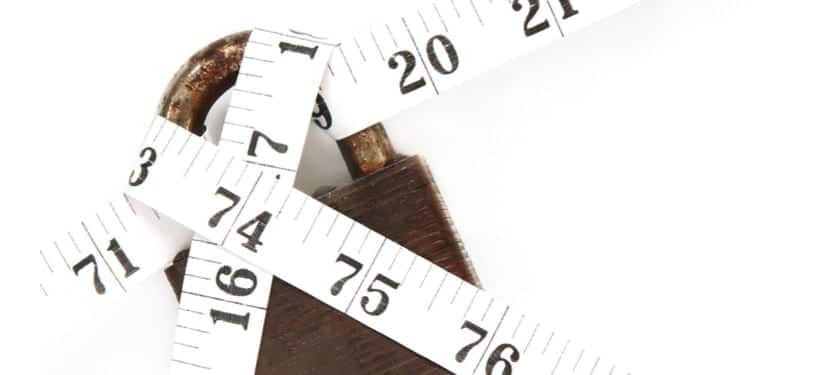So after days (or weeks) of finally deciding to make your “I will start dieting tomorrow!” reality, you cut back on your portions bit by bit. You start making healthier food options (salad with ranch dressing or vinaigrette?). You try to hit the gym at least three times a week.
And as months pass by, you can see changes: you feel lighter, healthier, leaner. You can see the numbers of your bathroom scale gradually going down. You go from a size 9 to a 7. You believe that change is coming, and there is nothing who can stop it anymore.
But one day, the arrow scale stops moving, or it barely loses a pound or two than last week. You push yourself harder. You increase reps, add more strength training, do more cardio workouts, but your weight remains the same number as it was two weeks, even a month ago. What happened?
While there are a lot of possible scenarios that could be the reason for you not losing more unwanted weight than what you possibly want, one of them could be this: weight loss plateau.
Weight Loss Plateau—What is it?
If you are experiencing almost the same situation as that mentioned earlier, you are not alone. In fact, it is a normal phase in dieting known as weight loss plateau, or a period in your routine wherein your weight does not seem to go down no matter how much effort you do.
How would you know if you are reaching a plateau? First, you must graph your weight progress every week. Once it goes into a straight horizontal across the page (can be straight, can be slightly crooked) that resembles that of a plateau, this phase has begun.
How Could This Be?
There are various reasons related to this, but in this article, only five most common reasons are given.
Stress is on the table.
As if you don’t have any more reason to avoid stress, it could also be the reason why you are not losing that belly pouch. Cortisol, the “stress hormone,” is affected by changes in the environment; as soon as the body feels a tension, cortisol levels shoot up, and it makes you want to reach for your favorite snack which is laden with so many calories and sugar. In some studies, women are more likely to do this than men.
Because of stress eating, your weight may swing up and down the scale, as your body tries to burn off the extra calories you ate the night before. This swing is not good for your body because it increases your risks for various ailments, like coronary heart disease and cancer, among others.
While you may not be able to control the different stressors around you (your boss, your family, and that annoying colleague), you can control the way you handle it. Instead of using food as temporary relief, try a healthier and less destructive route that is beneficial for you, like sleeping it off or doing a sprint.
You don’t sleep that much.
Sleep is as important as food and water in our lives. No matter how much you exercise and watch your diet, if you do not give your body time to recuperate and heal itself, the results are just as futile. Sleep deprivation would slow down your metabolism and signal your body to eat as a way to compensate.
Aside from that, lack of sleep may lead to lethargy, irritability, and a host of other medical concerns that can be detrimental both to your career and family life. Thus, it is vital that you include of sleep into your weight loss routine.
But how much sleep is good sleep? There are a lot of conflicting studies related to this—some say 7 hours is ideal, while some recent ones confirm that others can function in less. Even the National Sleep Foundation released guidelines about sleep hours depending on age.
The key is to listen to your own body. Try varying hours of sleep for a week, and assess which number of times you feel energetic and well rested.
The calories you eat are either too little or too much.
Yes, you do need to cut down calories while ramping up your exercise routine at the same time to lose weight. However, the process need not be drastic. Most of the time, your weight loss plateau accounts for the fact that you are restricting yourself too much on the first weeks. Then, when you cannot take the cravings anymore, you tweak it by adding your favorites here and there. Before you know it, you are back to the same eating habits you had, much to your dismay.
Another scenario: you are eating too little. At the start of your weight loss routine, it is a good thing. But in time, your body would learn to adapt to the deprivation and end up conserving energy in the form of fat, which makes the numbers on your scale remain the same despite your efforts.
Solution? Surprise your body. Schedule varying amounts of calories while partnering it with different exercise routines every day so that it won’t have a chance to adapt.
There are medical-related circumstances.
Some medical conditions could interfere with your weight loss routine, like polycystic ovarian syndrome (PCOS) and hypothyroidism. Some medications like antidepressants also get in the way and may even cause weight gain to some people.
But the most important thing to take note of is your hormones. Remember that hormones play a vital part in metabolism, growth, and development of your muscles and vital organs.
An example of this would be insulin. This hormone regulates blood glucose and how it enters your cells. Once the insulin’s role gets disrupted, the blood glucose that cannot enter the cells would accumulate and store as fat all around the body.
The best way to know if you are fighting with your genetics or medical condition is to check in with your doctor first before trying any exercise regimen—even the seemingly light ones, to avoid worsening your condition (if there is one) and feeling sad for your efforts.
You’ve reached your “set point.”
Set point theory is a phenomenon wherein your body is trying to maintain its ideal weight (or set point) and doing everything to keep it there. Simply put, your body is “happy” with its weight, thus, the plateau.
Some people try to push through this set point by increasing their exercise routine and decreasing their calories more just to drop in more pounds. However, some experts say that this “happy” state of your weight is usually the ideal number for your body to maintain its functions—any lower and it may disrupt the whole system. Or worse, the fat loss could deprive your body of fat-soluble vitamins like Vitamin A, E, and K, which are vital for regulatory processes. Your organs can also become vulnerable to wear and tear, as fats serve as a cushion for them.
Defeating your set point can be difficult—some even give up. But the most efficient way to get rid of this is to first review your weight loss goal: Is having a stick-thin, model-like body a better option than a bulky but healthy physique? After all, having a healthy body cannot be entirely determined by the scale. It is determined by how well your body can do its work for you.
If all else fails, listen to your body. You only have one, so you must learn how to know what it needs and take care of it.

